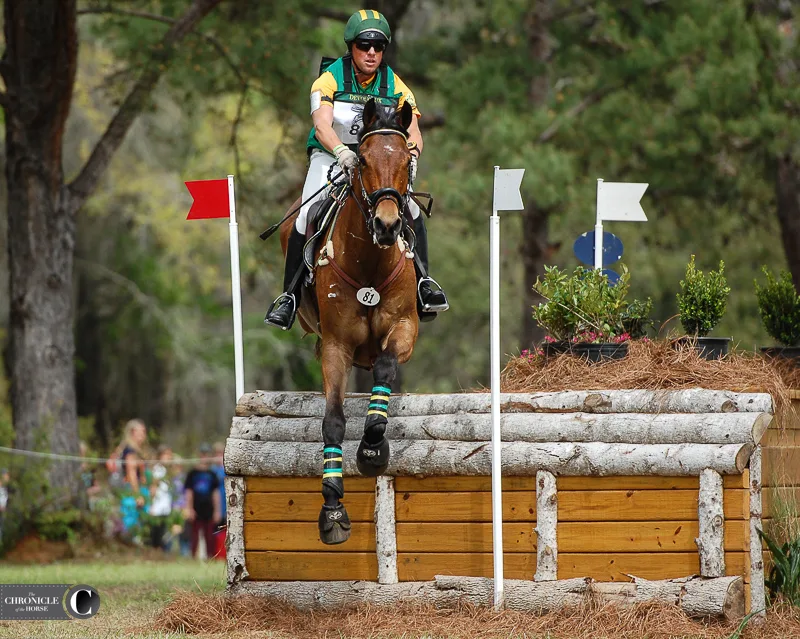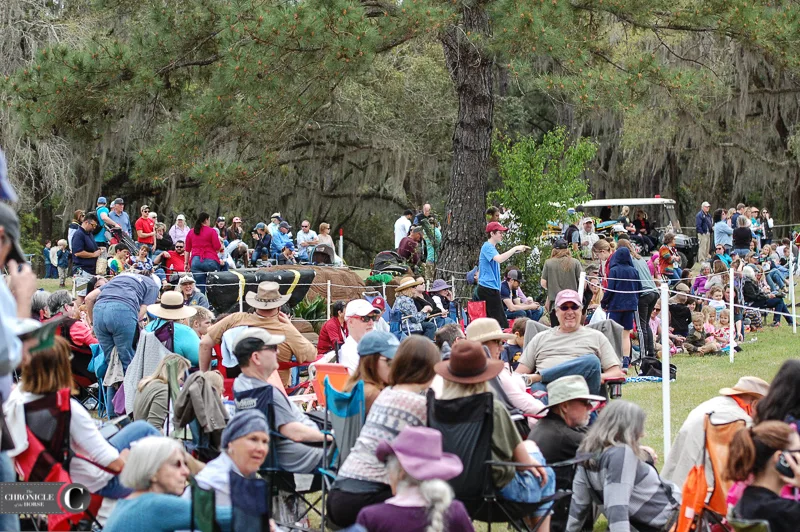After 25 years, Red Hills International Horse Trials is shutting down under a cloud of contention.
Organizers announced their decision Aug. 17, stating they believe the event is unsustainable due to the U.S. Equestrian Federation’s newly implemented calendar planning process, through which they would not be allowed to run their marquee division, the CCI4*-S. Red Hills unsuccessfully appealed USEF’s decision not to award them the division.
With its cancellation, Red Hills becomes one of several events to leave the calendar this year—Copper Meadows (California), Woodside (California), Groton House (Massachusetts) and Jersey Fresh International (New Jersey) have all ended their competitions. Jersey Fresh also cited the new USEF calendar process for their cancellation.
“We tried everything we knew to keep Red Hills viable,” said Red Hills co-organizer Jane Barron, who’s been involved with the Tallahassee, Florida, event since its inception in 1997.

Top riders head to Red Hills each March to contest the international divisions (Karl Slezak and Fernhill Wishes pictured). Lindsay Berreth Photos
Barron explained that Red Hills organizers learned last autumn that they did not have permission to run a CCI4*-S division under the new Eventing Strategic Calendar process that USEF implemented last year. The intent of the strategic calendar process is to “address sustainability concerns and structure a better pathway to properly develop and prepare high performance horses and athletes to be competitive” on the world stage, USEF said in a statement.
What that meant for Red Hills organizers, however, was learning they were not awarded a CCI4*-S for the March weekend on which that division has run since 2003, when it was first designed by Capt. Mark Phillips and ran as an FEI Eventing World Cup qualifier.
The 2023-2027 Eventing Strategic Calendar specifically addresses competitions at the CCI4*-L, CCI4*-S, CCI3*-L and advanced levels, and aims to put four-star short divisions on ideal weeks to allow for preparation for four-star longs and reduce competition density, according to USEF.
USEF appointed a task force in 2020 to create the new calendar process, which then went through an extensive review that involved stakeholders such as riders and organizers and received approval from the U.S. Eventing Association Board of Governors, the USEF’s Eventing Athletes Working Group, Calendar Working Group, Eventing Sport Committee, International Disciplines Council and USEF Board of Directors. The final product is a five-year strategic calendar that laid out what level of competitions USEF wanted to see in each area for each week of the year. Once the calendar was released, organizers were required to bid for the competitions they wanted to host. The 2023-2027 calendar did not include a CCI4*-S in Area III, which includes Florida, on “Week 10,” Red Hills’ normal March weekend, and instead designated that such an event—the first CCI4*-S of the year in the U.S.—be held the following week.
ADVERTISEMENT
Red Hills’ organizers knew when they bid on Week 10, which begins on March 11, 2023, that a CCI4*-S was not allocated for that date. And USEF accordingly awarded them an advanced division and the levels not covered by the Eventing Strategic Calendar process—a CCI3*-S, CCI2*-S and national horse trials. The first CCI4*-S of the year, to be held the following weekend—and a week earlier than it historically runs—went to Carolina International (North Carolina), in Area II.
Red Hills organizers sent in their application and filed a request for reconsideration, but Barron says they were denied without communication about why.
Moving their event could risk their longtime relationship with British course designer Mike Etherington-Smith, organizers explained in their application.
“I was overtly clear about the fact that our entire focus was to retain Mike E-S’s design capabilities, his educational focus and his safety focus,” Barron said. “If we were to be denied a four-star on Week 10, our second request, which was a separate application, was for Week 13 [April 1] when Mike did not have a conflict in England and could be back with us for the week. They didn’t consider that. It was awarded to TerraNova [Florida], which at that point had not even run a test event, not any event at all. It’s really hard to understand the rationale, but it’s really clear that Red Hills was not going to be given any consideration.”
Barron said they were grateful for their good run but lack an understanding of the justification of USEF’s decision, and they question whether the USEF process considered all bids equitably.
In its statement, USEF said that no exceptions have been or will be granted for now as they wait and see how 2023 pans out. They did confirm that Red Hills filed an appeal, which went through their hearing committee process, but the original decision to deny the CCI4*-S was upheld.
USEF said they acknowledged feedback, and president Tom O’Mara appointed a Strategic Calendar Review Task Force in April 2022 that’s begun to meet. That task force will review the 2023 calendar competition data and feedback once the season is over.
“It was communicated that the feedback regarding Red Hills’ request would be evaluated to see if the calendar could sustain an additional CCI4*-S as requested after the 2023 competition data was reviewed,” the statement said. “If a competition is unable to run their competition as awarded for the five-year cycle, the bid allocation is withdrawn, and the week, once approved, will re-open for bidding. In fairness to organizers, competitions cannot remain as placeholders and run selected years. The five-year cycle allows organizers to make investments in their infrastructure, develop their competitions, and allows athletes to plan their preparation with consistency.
ADVERTISEMENT
“We appreciate all that the organizers of Red Hills Horse Trials have done to grow and support the sport of eventing and it is unfortunate they have made the decision to discontinue the event. US Equestrian, with the help of the Task Force, aims to provide a sustainable eventing calendar to support and strengthen high performance opportunities and international success.”

Spectators flocked to Red Hills each year. The event was established in 1997, but as the first year was a near rain-out, organizers consider 1998 their inaugural year.
If Red Hills ran without the CCI4*-S in 2023 or beyond, Barron said it would be an uphill battle. Further complicating matters is the fact that Red Hills shares course builders Tyson Rementer and Levi Ryckewaert with Carolina International, which now would begin just a few days after Red Hills’ finish on Sunday.
“Not only is that not feasible for the riders, so one of the two events has to be foregone, but we have worked with Tyson Rementer and Levi Ryckewaert for 12 years, and they’re now in a position of compromise because they also build the following event. For the last couple of years we’ve had to shuffle and have them leave in the middle of our prep session to go meet with Ian Stark [for Carolina International] when he can be in the country, and frankly, that becomes dangerous. That stretches somebody who normally pays extreme attention to safety and puts them in a very compromising position. Not only does it cut the potential for our entries, there’s simply no way for that arrangement to be feasible. When there was absolutely no consideration and no conversation about a way to make this work, there didn’t seem to be any other option.”
In addition to the complications with shared course builders, Barron said the organizing committee was nervous to take a gamble on running without their feature class. Red Hills brings in more than 20,000 spectators, most of them local, to Elinor Klapp-Phipps Park.
When trying to market the event to the local community, it helps to be able to say that the country’s top riders will be attending, she said. When there’s no CCI4*-S, it becomes harder to sell the experience to spectators and sponsors.
“It is very difficult to engage sponsors who are very willing to write a significant check to come and watch the lower levels,” she said. “Grandmamas are one thing, but sponsors willing to invest in an event that tries to make the weekend extremely nice for the sponsors as well as very personal and very engaging for the riders—so without a four-star, and given the fact that the first four-star of the season is almost a compulsory for anyone trying to make an international team, we simply would not have that caliber of rider who could come to Red Hills because they’ve got to have the MER requirements to be able to compete at those levels. So it just cut the knees right out from under us.”
Barron said the event costs between $500,000 and $600,000. Stabling tents need to be confirmed almost a year in advance and can run around $80,000. Tents for people can cost nearly as much.
“When we realized we were not going to be allotted the grace year to redefine the event, and we had escalating costs, and our revenue stream was cut, it was simply not feasible,” she said. “There is a huge black hole we could have fallen into. With all the pieces falling into place ideally, we could have altered the event and pulled it off, but that was riskier than not.”















